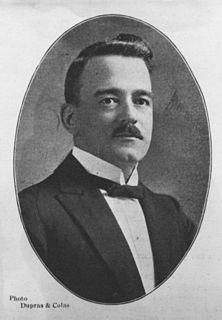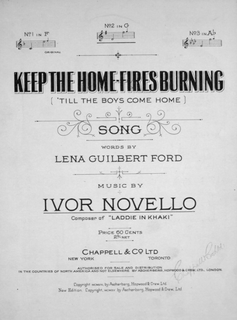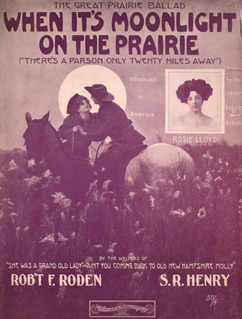
Blue Amberol Records was the trademark name for cylinder records manufactured by Thomas A. Edison, Inc. in the US from 1912 to 1929. They replaced the 4-minute black wax Amberol cylinders introduced in 1908, which had replaced the 2-minute wax cylinders that had been the standard format since the late 1880s. Blue Amberols can play for as long as 4 minutes and 45 seconds and have a surface layer of the "indestructible" plastic celluloid, which Edison tinted a trademark blue color. Edison brand phonographs designed to play Amberol cylinders were named Amberolas.

The "Battle Cry of Freedom", also known as "Rally 'Round the Flag", is a song written in 1862 by American composer George Frederick Root (1820–1895) during the American Civil War. A patriotic song advocating the causes of Unionism and abolitionism, it became so popular that composer H. L. Schreiner and lyricist W. H. Barnes adapted it for the Confederacy.

Byron George Harlan was an American singer from Kansas, a comic minstrel singer and balladeer who often recorded with Arthur Collins. The two together were often billed as "Collins & Harlan".

Ada Jane Jones was an English-American popular singer who made her first recordings in 1893 on Edison cylinders. She is among the earliest female singers to be recorded.
"Hesitation Blues" is a popular song adapted from a traditional tune. One version was published by Billy Smythe, Scott Middleton, and Art Gillham. Another was published by W.C. Handy as "Hesitating Blues". Because the tune is traditional, many artists have taken credit as writer, frequently adapting the lyrics of one of the two published versions. Adaptations of the lyrics vary widely, though typically the refrain is recognizably consistent. The song is a jug band standard and is also played as blues and sometimes as Western swing. It is cataloged as Roud Folk Song Index No. 11765. Composer William Grant Still arranged a version of the song in 1916 while working with Handy.

"Chicken Reel" is a dance tune. It was composed and published in 1910 by Joseph M. (Michael) Daly (1883–1968), with copyright registered on October 7. Joseph Mittenthal added lyrics three months later, and the texted version was copyrighted on January 12, 1911.

"Tenting on the Old Camp Ground" was a popular song during the American Civil War. A particular favorite of enlisted men in the Union army, it was written in 1863 by Walter Kittredge and first performed in that year at Old High Rock, Lynn, Massachusetts.

Pierre-Aurèle Asselin (1881–1964) was a French Canadian furrier and tenor singer. Asselin came from a musical family; he was the brother of mezzo-soprano Marie-Anne Asselin and great uncle of pianist André Asselin.

"Down by the Old Mill Stream" is a song written by Tell Taylor. It was one of the most popular songs of the early 20th century. The publisher, Forster Music Publisher, Inc., sold 4 million copies.

"Keep the Home-Fires Burning " is a British patriotic First World War song composed in 1914 by Ivor Novello with words by Lena Guilbert Ford.

"Ballin' the Jack" is a popular song from 1913 written by Jim Burris with music by Chris Smith. It introduced a popular dance of the same name with "Folks in Georgia's 'bout to go insane." It became a ragtime, pop, and trad jazz standard, and has been recorded hundreds of times.

"The Trail of the Lonesome Pine" is a popular song published in 1913, with lyrics by Ballard MacDonald and music by Harry Carroll. It was inspired by John Fox Jr.'s 1908 novel of the same title, but whereas the novel was set in the Cumberland Mountains of Kentucky, the song refers to the Blue Ridge Mountains of Virginia. In it, the singer expresses his love for his girl, June, who is waiting for him under the titular pine tree.

"When It's Moonlight On The Prairie" is a popular song published in 1908 with lyrics by Robert F. Roden and music by S.R. Henry. The lyrics tell of a cowboy eloping with his Mary. The chorus is:

"Pride Of The Prairie" is a popular song written in 1907 with music by George Botsford and lyrics by Henry J. Breen. The lyrics tell of a cowboy's love for Mary, the "Pride of the Prairie".

"Blue Feather" is a popular song written in 1909 with music by Theodore F. Morse and lyrics by Jack Mahoney. In the song the singer is expressing his love for sweet Blue Feather. The chorus is:

"Anona" is a popular song supposedly written by Vivian Grey, but in fact composed by Robert Keiser King in 1903, both as an intermezzo and a vocal number. Popular in its day, it was recorded a number of times.

"Hiawatha " is a song written by Neil Moret in 1901. James J. O'Dea (1870–1914) added lyrics in 1903 and the music was re-subtitled "(His Song to Minnehaha)".

"Golden Arrow " is popular song published both as an intermezzo two-step and a ballad in 1909. The music was composed by Egbert Van Alstyne, with lyrics added by Harry Williams. The ballad is a love story between the unnamed son of a Chief Arrow-Bow and a maiden named Golden Arrow, both of the Sioux nation in Idaho.
"Cohen on the Telephone", also known as "Cohen at the Telephone" is a comedy monologue. The monologue was released on cylinder records, 78 rpm records, and early sound film.

"Sipping Cider Thru' a Straw" is a 1919 novelty song, also called "Thipping Thider Thru a Thtraw", composed by Tin Pan Alley songwriters Carey Morgan (1885–1960) and Lee David (1891–1978) and published by Joseph W. Stern & Co.


















